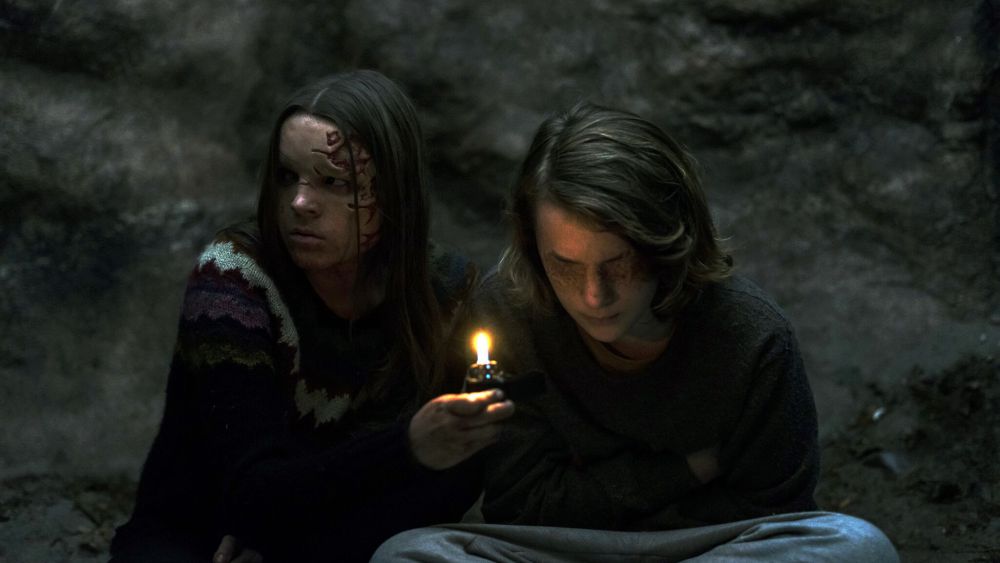To get away with leaving a story’s central mystery completely unexplained, a film has to provide something else for an audience to latch onto. Take “Mulholland Drive,” for instance. It’s never quite clear what’s real and what’s not, but David Lynch has made that uncertainty so central to the narrative, and so spellbinding, that it’s no longer an object. Where mystery is concerned (if in no other way), “The Dark” seems to be going for something similar. Justin P. Lange’s debut film has an abundance of mysteries, which hint at some loftier storytelling ambitions, but there’s only so much that can be accomplished over the course of a single movie, and only so far you can get if almost all of a film’s mysteries remain unsolved.
The main reason that it all holds together at all is Nadia Alexander. As Mina, a monstrous young woman who is introduced to us as she hunts down and then devours an adult man, she sells each and every shift in the story to the point that she almost manages to disguise just how abrupt they sometimes are. When Mina discovers Alex (Toby Nichols), who has been rendered blind, in her victim’s car, her status quo begins to change.
Given how predictable the story is, the imagination catches instead upon how and why these children are the way they are. Without giving anything away (let’s just say it has to do with the popular fascination with female pain), there’s an imbalance in how explicitly their past traumas are rendered that makes one of the flashbacks even more upsetting to sit through than it would be. It makes it all the more a shame that the excellent Karl Markovics, who plays Alex’s erstwhile kidnapper, is so underused. There’s a lot happening in “The Dark;” it’s just a pity that we can’t see all of it.

By contrast, almost everything seems to be on display in “Untogether.” This is something of a mixed blessing, though that might be apt for a film about the bloom and decay of interpersonal relationships. The parts of the film that feel affected—Andrea (Jemima Kirke) seems to exclusively wear vintage clothing, drops endless pop culture references, and impulsively copy-edits everything she reads, including the Torah—feel über-affected, the way that personality traits sometimes do when you’re trying to impress a date.
But there are also some strands of truth woven into the film (Emma Forrest’s directorial debut), and they’re stark enough when they show through that it’s hard not to wish there were more. To parse it through the metric of “show, don’t tell,” “Untogether” is at its best when we get glimpses of these characters’ interior lives through beats and gestures, and weakest when their quirks are quite literally spelled out.
As Tara, Andrea’s younger sister, Lola Kirke fares the best in terms of balance. She’s one of the satellites in Andrea’s orbit, caught between the life she has with her boyfriend (Ben Mendelsohn) and the life she’s begun to explore through religion. The assessment of the fallout is the best scene the film has to offer.

“Amateurs” is one of the best films—if not the best film—at Tribeca this year. Set in the fictional Swedish town of Lafors, Gabriela Pichler’s second feature follows the members of the community as they attempt to make a film, hoping to entice a German supermarket chain into opening a store there. To bring the story to life, Pichler has assembled a cast of professional and non-professional actors (the three leads are all first-timers), and the result is magical.
The community-made film is, perhaps obviously, a means to an end. It’s Pichler’s way of cracking open Lafors’ lid, and giving us a better look at the lives of her characters as well as the ups and downs inherent in modernization. Though the stakes may initially seem low, “Amateurs” builds into more striking territory, addressing class divisions as well as racial prejudice. When Aida (Zahraa Aldoujaili) and Dana (Yara Aliadotter), both from immigrant families, get into trouble for getting in the town council’s way, their guardians handle the situation vastly differently. Dana’s parents, who are well off, encourage her, while Aida’s aunt, who is decidedly middle-class, doesn’t see Aida as having the luxury of going against the grain. But in both instances, the impulse is born from wanting to provide the best possible opportunity for their children.
Given how strong an impression Aldoujaili and Aliadotter make, it’s all the more impressive that Fredrik Dahl nearly steals the whole show as mild-mannered councilman Musse. Musse, too, is from an immigrant family, but he’s no less Swedish for it; it’s something he’s taken for granted, but quickly comes to realize isn’t quite as widely accepted as he’d thought when, despite being in charge of the film project, he’s left offscreen due to the fact that he isn’t white. Though the details of these characters’ stories may seem mundane, Pichler has managed to coax something wonderfully touching out of them (the most beautiful shot in the whole film is made possible by dish soap), and created something just as essential for an international audience as for a Swedish one.











